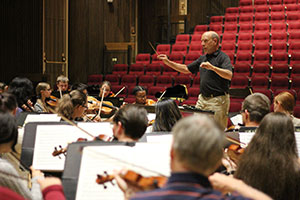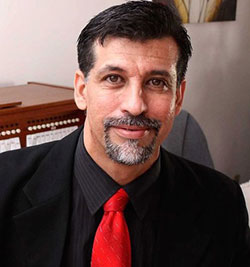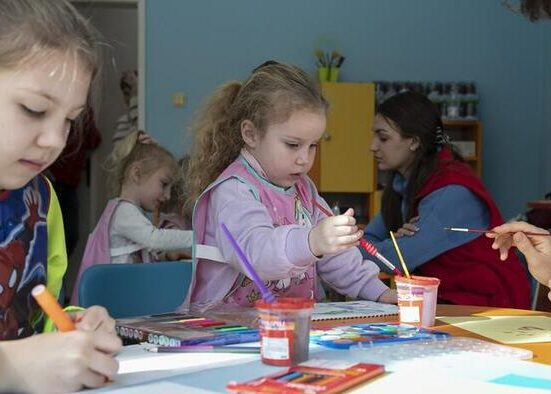
University of Wyoming Department of Music Professor Michael Griffith will conduct
the UW Symphony Orchestra at 7:30 p.m. Thursday, Nov. 16, in the Buchanan Center for
the Performing Arts concert hall.
A set of Eastern European folk dances, a Brazilian piano concerto and a Finnish symphony
— can variety be a unifying theme for a concert? Audience members will discover the
answer at the University of Wyoming’s Symphony Orchestra (UWSO) concert at 7:30 p.m.
Thursday, Nov. 16, in the Buchanan Center for the Performing Arts concert hall.
Tickets are $14 for the public, $10 for senior citizens and $4 for students. A nominal
processing fee will be charged for each ticket. To purchase tickets, visit the Performing
Arts box office, call (307) 766-6666 or go online at www.tix.com/ticket-sales/uwyo/6984.
The concert opens with Zoltan Kodály’s “Dances of Galánta,” Extraordinarily popular,
the piece is among many compositions either in the style of or actually quoting traditional
folk-dance tunes. Brahms’ “Hungarian Dances”; Bartok’s “Romanian Folk Dances”; Janacek’s
“Moravian Dances”; Akpabot’s “Three Nigerian Dances”; and Grieg’s “Norwegian Dances”
are all examples.
“Kodály’s ‘Dances of Galánta’ is among the most performed for reasons that will be
obvious when you hear the music: It is poignant at times, proud and, in the fast portions,
wonderfully exciting,” says Michael Griffith, UW director of orchestral activities.
Galánta is a town in Slovakia, just east of Bratislava, the Slovak capital. “These
dances will take the place of an overture and work well there,” Griffith says. “Then
comes a piano concerto. What could be more traditional than a piano concerto after
the overture? But there tradition ends.”
The concerto is by M. Camargo Guarnieri, an important Brazilian musician and director
of the São Paulo Conservatory. While the piece has no direct folk or popular music
in it, the audience will hear the same rhythmic impulses that lead to samba and an
ineffable melodic suggestion of the tropics.
“Combine that with a highly sophisticated harmonic structure, and you have a wonderful,
unusual piece,” Griffith says.
After intermission, the concert will be filled by Symphony No. 3 by Jean Sibelius.
Many concert lovers know Sibelius from his “Finlandia,” which the UW orchestra performed
last season. Symphony No. 3 is less well known but, in Griffith’s opinion, is an incredible
symphony.
Some melodies are vaguely folk-like, there is a spiritual quality to many moments,
and it all exudes Sibelius’ darker Finnish personality, he adds.

Carlos Costa
“Commentators say that it could only have been written in a land where it is dark
all day in winter and sunny all day in summer,” Griffith says. “True or not, you certainly
hear the extremes of mood in the piece. The UWSO is very excited to bring it to Laramie.”
The concert will feature the return of Carlos Costa to UW as a piano soloist. Originally
from São José dos Campos, Brazil, Costa currently is a professor of conducting, piano
and group piano professor at the Universidade Federal de Goiás (UFG). He has a bachelor’s
degree in physics from Unicamp (Brazil); a bachelor’s degree in piano from the University
of Alabama-Huntsville; a master’s degree in piano from Ohio State University; and
a master’s degree in conducting and a doctorate in piano, both from the University
of Georgia.
As a soloist and chamber musician, Costa has performed in Portugal, Italy, the United
States and in several Brazilian states. He conducted the University of Georgia Symphony
Orchestra, the Goiânia Symphony Orchestra, the UWSO and others. He founded the UFG
Jean Douliez Academic Orchestra in 2006.
Among his most recent performances are the solo piano recital at Universidade Federal
do Rio Grande do Sul (Porto Alegre); played the Mozart piano concerto accompanied
by the Mozart Italy/Goiás Association Orchestra in Pirenópolis, Goiás; and presented
a recital with tenor Adriano Pinheiro with Brazilian repertoire at the International
Musicology Symposium in Goiás.
Costa coordinated the music graduate program of UFG from 2014-17, when he also was
the president of three editions of the National Music Research Seminar.
For more information, email Griffith at symph@uwyo.edu.







